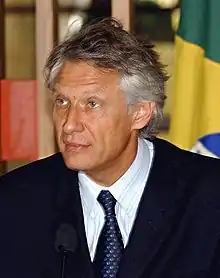The French Minister
The French Minister (French: Quai d'Orsay) is a 2013 French comedy film directed by Bertrand Tavernier. Based on Quai d'Orsay, a comic strip by Christophe Blain and Abel Lanzac, the film takes an initially comedic look at the French Foreign Ministry under Dominique de Villepin but moves into more serious territory as France, in co-operation with Germany, opposes the 2003 Invasion of Iraq.
| The French Minister | |
|---|---|
_-_french_poster.jpg.webp) French theatrical release poster | |
| Directed by | Bertrand Tavernier |
| Produced by | Isabelle Kostic Crosley |
| Written by | Christophe Blain Abel Lanzac Bertrand Tavernier |
| Starring | Thierry Lhermitte Raphaël Personnaz Niels Arestrup |
| Music by | Philippe Sarde |
| Cinematography | Jérôme Alméras |
| Edited by | Guy Lecome |
| Distributed by | Pathé |
Release date |
|
Running time | 113 minutes |
| Country | France |
| Language | French |
| Budget | $10.6 million [1] |
| Box office | $5.6 million [2] |
It was screened in the Special Presentation section at the 2013 Toronto International Film Festival.[3][4] In January 2014, the film received three nominations at the 39th César Awards,[5] with Niels Arestrup winning the award for Best Supporting Actor.[6]
Plot
After graduating from the École nationale d'administration, which trains France's leaders in the public and private sectors, Arthur Vlaminck lands a job as speechwriter in the Foreign Ministry. Existing senior advisers do not welcome a talented newcomer who may become a competitor but his abilities are recognised by the Minister and, most important, by Maupas, the career official heading the department. That said, coming up with the right words for the constantly changing world situation and the constantly changing reactions of the Minister proves no easy task. He gets hastily written drafts past Maupas, and past other senior advisers who rubbish them, only to find that the Minister's needs have changed. The film ends in February 2003 with a re-enactment of the actual speech by Dominique de Villepin to the UN Security Council, at which he contradicted claims by Colin Powell and Donald Rumsfeld and argued passionately for disarmament of Iraq but not invasion.
Cast

- Thierry Lhermitte as Alexandre Taillard de Worms (based on Dominique de Villepin), French Minister of Foreign Affairs
- Raphaël Personnaz as Arthur Vlaminck, a young speechwriter
- Niels Arestrup as Claude Maupas, the phlegmatic civil servant who actually runs the ministry
- Julie Gayet as Valérie Dumontheil, special adviser on Africa
- Jane Birkin as Molly Hutchinson, winner of the Nobel Prize for Literature
- Anaïs Demoustier as Marina, Arthur's fiancée
- Alix Poisson as Odile, Maupas' secretary
- Sonia Rolland as Nathalie, special adviser on relations with Parliament
- Marie Bunel as Martine, the minister's secretary
- Thomas Chabrol as Sylvain Marquet, special adviser on Europe
- François Perrot as Antoine Taillard
Locations
The film includes scenes shot in Berlin, near the Reichstag, Dakar, as a fictional African country, and the United Nations Building in New York.
Quoted material
- The film sections are preceded by quotations from the Fragments of the Greek philosopher Heraclitus.
- The final speech at the UN is taken from de Villepin's address on Iraq at the United Nations Security Council on 14 February 2003.
References
- JP. "Quai d\'Orsay (The French Minister) (2013)- JPBox-Office". www.jpbox-office.com. Retrieved 23 October 2017.
- "The French Minister (2014) - International Box Office Results - Box Office Mojo". www.boxofficemojo.com. Retrieved 23 October 2017.
- "Quai d'Orsay". TIFF. Retrieved 10 August 2013.
- "Quai d'Orsay". unifrance.org. Retrieved 23 January 2014.
- "Berenice Bejo, Lea Seydoux, Roman Polanski Among France's Cesar Awards Nominees". Hollywood Reporter. Retrieved 1 February 2014.
- "France's Cesar Awards: 'Me, Myself and Mum' Wins Best Film". Hollywood Reporter. Retrieved 1 March 2014.
- Lemercier, Fabien (27 September 2012). "Bertrand Tavernier to plunge into the secretive Quai d'Orsay". Cineuropa.org. Retrieved 25 March 2013.
